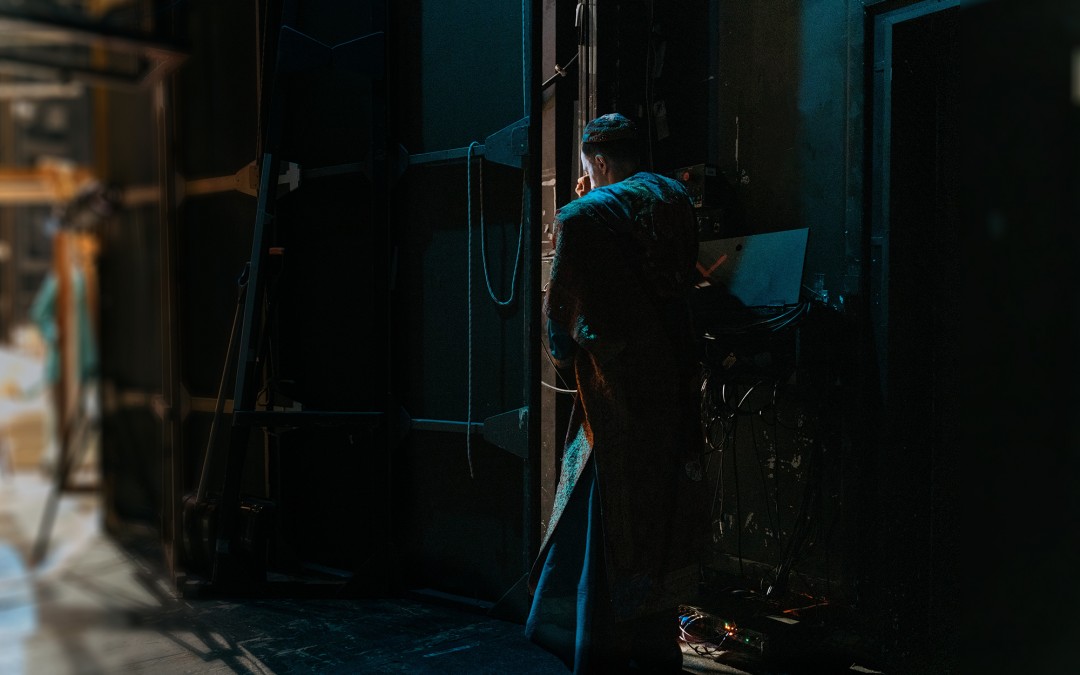When I was a young stage manager, I thought about leaving the Midwest to find work in New York, and knocked around Broadway for a few weeks. I was bold. I would call the theaters, and get the production stage managers on the phone, explaining that I had credentials and was thinking about relocating to the city. Could I shadow them? A surprising number said yes. I hope I thanked them proportionately to the favor.
And that is how I found myself watching the Richard Burton Camelot from backstage in Lincoln Center.
There was, and is, a certain kind of geography in the wings; a person who knows how to be still can just about tuck up near the SM, who often runs the show from the stage right, downstage corner, what used to be called “in one” in a proscenium. You are very close, but out of the sightlines. All the concentration is on stage. To get there, each performer must cross between the dark and the light, a single step that contains all the magic and power and propulsion of the theater. It happens thousands of times every week in the theater world, but no audience member has ever seen it. No audience member ever will. Offstage is the mechanism of the theater, with prop tables and dirt and costume racks and stagehands lounging around the flyrail, waiting to pull scenery. Onstage is the magic.
In the wings at Camelot, I was enthralled, watching the mechanism work, all wide eyes and ears, and listening to the story unfold on stage. Merlyn and Arthur and Guenever. Then Lancelot. A familiar story, old and strong. Actors would appear from the downstairs dressing rooms, or disappear there. Toward the end of the first act, the chorus appeared, the Knights of the Table, in very offstage mode, shuffling and clunking up the stairs, poking and whispering, indifferent, pedestrian. Burton as King Arthur was moving toward his speech at the end of the first act, when he is discovering that Guenever does not love him. From the script: “I mean, when people hear…what has happened at Camelot…they may lay down their arms and come of their own free will…it’s quite possible no one will bear arms at all any more…and that there will really be peace …all borders will disappear…and all the things I dreamed…I dreamed … I dreamed…” (His voice trails off in utter defeat, and he stands motionless in an abject trance. The sound of the March to the Grand Hall is heard in the orchestra, as the lights dim out slowly.)”
When that sound was heard from the orchestra pit, the ragged line of actors offstage began to straighten. Several crushed out their surreptitious cigarettes. They filed past the prop table, picking up their spears and, as they crossed into the light, set their jaws and transformed each by each into someone entirely else. Sir Someone. And Sir Someone Else.
Years have passed since that moment in New York and I had trouble placing the moment when Burton was declaiming on stage in his deep round tones, and the chorus men were preparing to march on. So I called Tony Vierling, the Twin Cities musical theater actor who has done three Camelots, two of them at Chanhassen. Tony found that moment in his no-doubt-battered script and refreshed me on the counterpoint of the onstage oratory and the chorus men. “I found it!”, he said. “This is it!!!! Exactly the moment!!! So powerful, he is willing to sacrifice his love for them both for this great ideal! And so tragic!! Then this beautiful moment of pomp, ceremony, and tradition. This is the exact moment! Whew!” Tony, who lives a life full of exclamation points, has spent decades stepping across that threshold from the dark into the light. He knows the moment of change well, and the moment of power, too.
I decided against pursuing New York, and came back to the Midwest to spend my life, this life, here. I’ve watched many fine performers cross that line from the dark into the light, dropping their own personae to the deck as they step through, assuming something beyond themselves in the same way the chorus boys dropped their cigarettes, grasped their spears, threw their shoulders back, and became noble. “The Knights of the Court,” says the script, “parade to the Grand Hall with banners flying in ceremonial drill.” And so they did, and Burton made his exit, and I watched them go.






































